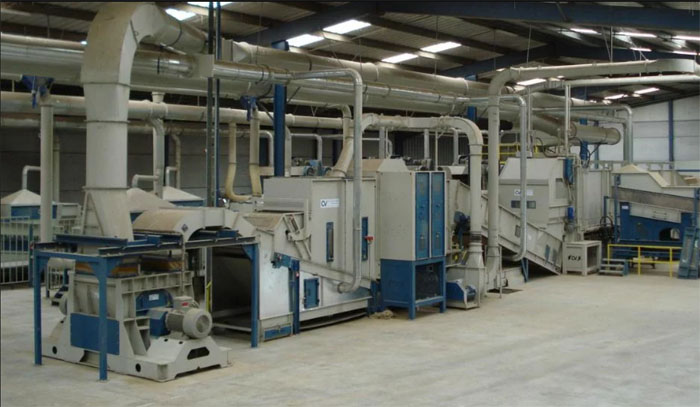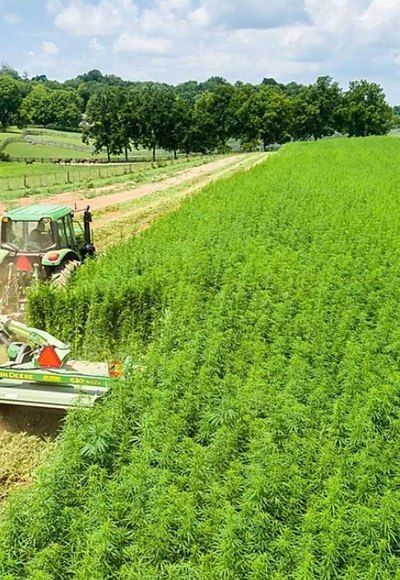|
|

|
  
Features
Update 2019/8/6
Plastics
REPLACING PLASTIC – CANADIAN COMPANY CIHC SET TO REVOLUTIONIZE HEMP WASTE
By Suzanne Forcese
In the book, The Emperor Wears No Clothes, author the late Jack Herer states, “If all fossil fuels and their derivatives, as well as trees for paper and construction were banned in order to save the planet, reverse the Greenhouse Effect and stop deforestation; then there is only one known annually renewable natural resource that is capable of providing the overall majority of the world’s paper and textiles; meet all the world’s transportation, industrial and home energy needs, while simultaneously reducing pollution, rebuilding the soil, and cleaning the atmosphere all at the same time…and that substance is – the same one that did it all before – Cannabis Hemp.”
Hemp farming and production dates back to 8000 B.C.; but has only become legal in Canada in 1998, after prohibition in 1938. In 2018 hemp production was legalized in the United States.
With 94 million arable acres of land, Canada is uniquely positioned to have a world-beating hemp fibre industry.
Founder and CEO, Robert Ziner, of Canadian Industrial Hemp Corporation (CIHC) has a mission “To become the global low-cost processor of hemp stalk into high-value bio-fibre and bio-composite products.”
Bast fibre from hemp stalks is one of the strongest and most durable of all natural fibres which can be used to make textile products, nanotechnology materials for supercapacitors that outperform graphene at a fraction of the price. As well, hemp hurd – the inner woody core of the hemp stalk can be used for building materials to produce carbon neutral to carbon negative homes depending on binder and finish recipes.
And more…
Bioplastics, composites, paper, inks, paints, adhesives, fillers, and a myriad of other industrial products can be made using hemp stalks instead of petroleum and wood-based competitors.
It would appear that hemp is the miracle product capable of solving our environmental issues.
Yet, in Canada last year, 400,000 tonnes of hemp and flax stalk was burned or disposed of costing farmers 10% of their entire seed crop revenue. The potential value of that wasted stalk is $400 million.
WaterToday spoke with JJ Ziner, CIHC Analyst, who told us, “In Canada we import millions of dollars’ worth of raw hemp fibres and millions of dollars’ worth of hemp products.”
Until now, there has been no large scale operation in Canada that can provide a consistent high quality grade of hemp fibre to manufacturers. “We expect that in 6-12 months we have proven enough demand to justify production in Canada,” JJ Ziner told us.
Robert Ziner has stated, “Although large scale industry for processing stalk into fibre has not yet been established in Canada, this industry is already thriving in China and across Europe generating over $1.3B per year in combined sales. These regions of the world never made growing hemp illegal, allowing the industries to keep developing proprietary techniques and value added opportunity.”
“In the past, the problem with hemp fibre production in North America has been a lack of quality control. Manufacturers have not been able to rely on consistent quality,” JJ Ziner said.
CIHC has partnered with NRC, Sightline Innovation, and Cretes “our strategic partner equipment manufacturer out of Belgium (who has been in this business for 100 years), to create a state-of-the-art process using a scanner to control the quality and quantity of our natural fibres.”

Decorticator - Photo Courtesy CHIC
CIHC’s patent-pending technology integrates proven large-scale European hemp stalk processing (decortication) equipment with proven advanced manufacturing technologies to increase margins. (Photo Courtesy Canadian Industrial Hemp Corporation)
JJ Ziner adds that the Alberta Government provided the initial $50,000 in funding and the Federal Government has provided $10 million in repayable funds toward the development of CIHC’s first facility in Alberta where the Company will convert 50,000 tonnes of agricultural waste into a low cost, scalable replacement for plastic.
The goal is to produce high quality fibre for three major markets. “Our biggest market is in kitty litter,” JJ Ziner said. There is an estimated $1.3B market in kitty litter. “Our hemp product is a lower cost, odor controlling, and high performance alternative to bentonite clay.”
Secondly, CIHC will be producing bio-pellets for plastic, an estimated $7B market. Compared to pure plastics, hemp is lighter, stronger, mold-able, impact resistant and lower in cost, making it ideal for construction materials, the automobile and aerospace industries.
Hemp is already being made into compressed door panel and dashboards. Carmakers such as Ford, GM, Chrysler, Saturn, BMW, Honda and Mercedes are currently using hemp composite door panels, trunks, headliners. “Exactly what we are proposing for North America is ongoing in Europe,” JJ Ziner said. Virtually all European car makers are switching to hemp based door panels, columns, seat backs, boot linings, floor consoles, instrument panels and other external components because hemp based products are lighter, safer in accidents, recyclable and more durable.

Mercedes parts made of Hemp. Photo Courtesy CHIC
In addition to kitty litter and bio-pellets, CHIC will be producing bio-fibres which will have an estimated $3.5B market with applications in textile fibres, industrial plastic, automobile and electronics industries.
The path forward for Canada’s first large-scale quality controlled hemp is in attracting large scale manufacturers that are poised to utilise low-cost Canadian hemp fibre.
But most importantly, JJ Ziner emphasizes, it is the Canadian Farmer who is at the base of this win-win-win enterprise.
“In the midst of a climate crisis and plastic waste crisis, the hemp renaissance is emerging to lead the way to a solution. And this time around, the farmers are in charge,” (investigative journalist and author Doug Fine, in Hemp Bound). Hemp crop can be grown organically and re-generatively without the use of petrochemical fertilizers and toxic herbicides.
The Canadian Prairies offer the perfect conditions for growing hemp – a crop that requires little water, few or no pesticides, and is a God-send for bees, according to a study on Bee Diversity and Abundance On Flowers of Industrial Hemp, by C. O’Brien, H.S. Arathi (Elsevier). “Our results documenting bee diversity in flowering hemp provides the impetus for the development of integrated pest management plans that protect pollinators while controlling pests.
“We are ensuring our farmers that instead of receiving $250/tonne of hemp stalk, they will receive $750/tonne. Additionally we are giving our farmers a large percentage of shares in our Company. Our tech system also includes data analysis. Farmers can record such things as timing of seeding, weather conditions, yield and every other detail of their crop to use as a data base.”
CIHC is on a trajectory to build 5 facilities in 5 years to become the lead supplier of large volumes of low cost, quality controlled hemp fibres to large commercial manufacturers in North America thus eliminating the need for expensive hemp fibre and hemp product imports.”
“At the end of the day,” JJ Ziner adds, “it’s the farmers who are the most important element of this venture of a natural product processed in a natural way. We fully support our farmers and want them to prosper.”

Hemp Field
suzanne.f@watertoday.ca
|
|
|
Have a question? Give us a call 613-501-0175
All rights reserved 2025 - WATERTODAY - This material may not be reproduced in whole or in part and may not be distributed,
publicly performed, proxy cached or otherwise used, except with express permission.
|
|